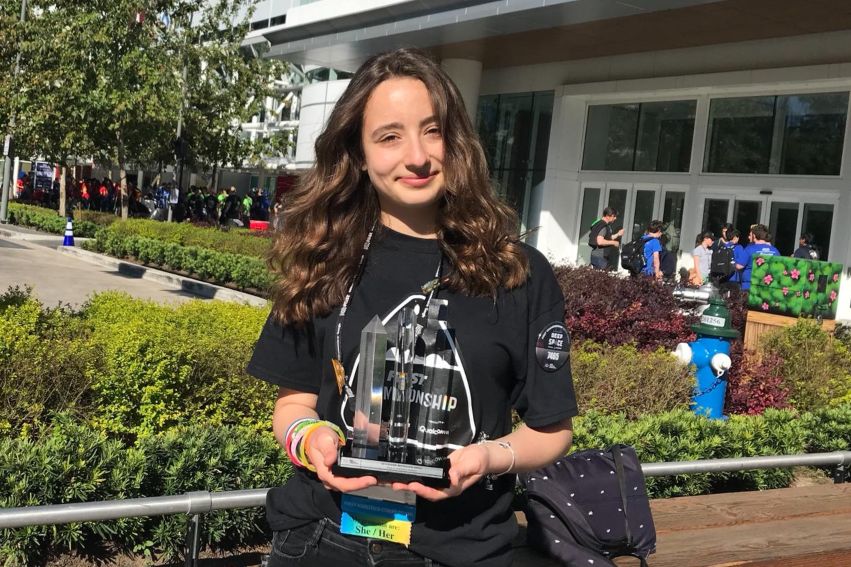4 December 2020
Turkish Student Explores Her Passion for Aerospace Engineering In Online Program
By Margaret King
[4 minute read]

There's a lot of talk these days about distance learning, but 18-year-old Miray Özcan took the concept to a new level when she enrolled in a summer space-science class from Sally Ride Science Junior Academy.
The 12th grader lives in Turkey in the Black Sea port city of Samsun, some 7,000 miles from UC San Diego, where Sally Ride Science is based. Because of the 10-hour time difference, she had to log in at midnight Turkish time to take part in Zoom sessions in the week-long online course, titled "History of Space, Astronauts and Technology."
For Miray, the experience was worth the late nights. "Taking this class really helped me to find a passion, which is aerospace engineering," she said in a Zoom call from Samsun.
"I enjoyed challenging myself," she added. "The class was five days long, but it was an intense course. We had to work on our projects after course hours, and we had to present our final project. It took me long hours to work on it, but I enjoyed it."
Miray's final project was a technical report describing a habitat to sustain humans on Mars. Her design includes three hexagonal buildings. The hexagon shape, inspired by honeycomb, combines strength and efficiency, she wrote. Her habitat also features dust-resistant wind turbines to provide power, a geothermal heating system, and an aeroponic farm to produce food.
The class's instructor, Phillip Ballo, was impressed. "Miray did some incredible college-level research in regard to her technical report," he said. "Rather than picking the first results that appeared on the first page of Google, she found peer-reviewed research from credible sources."
Cool coincidence
Miray said a "cool coincidence" led her to the Sally Ride Science class. "I was searching for online summer programs so I could challenge myself beyond my classes at school," she said. "I needed a good scholarship to afford a summer course in the United States."
She found an interesting biology program at UC San Diego Extension, but the application deadline had passed. Miray sent an email asking if the deadline could be extended, and someone at Extension responded by suggesting she try Sally Ride Science Junior Academy instead.
Sally Ride Science was cofounded by America's first woman in space in 2001 to inspire all students, especially girls, in STEM (science, technology, engineering and math). In 2015, Sally Ride Science became part of UC San Diego under the direction of Extension. The Junior Academy, launched in 2016, provides dozens of innovative summer workshops for students in grades 4-12. The in-person workshops moved online this past summer due to the coronavirus pandemic.
Miray had developed an interest in space exploration through her involvement in a space-themed robotics competition. In fact, her team got to travel to Houston in 2019 for the world championships of the FIRST Robotics Competition. (The photo above shows her at the Houston competition.)
When Miray looked over the Junior Academy course list for high school students, she settled on "History of Space, Astronauts and Technology." She received a scholarship to take part in the class.
In addition to learning about space travel and technology, students got an introduction to Blender, an open-source 3D modeling software toolset. Some students used Blender to model their Mars habitats, but Miray opted for a written report.
Although the course was challenging at times, assistance was close at hand. "Mr. Ballo was really helpful," Miray said. "He happily answered all of my questions."
Taking a class in English posed no problem for Miray. She has been taking English classes since fourth grade, including a year-long immersion program before she started high school, and she has worked hard to improve her fluency in the language.
College and beyond
These days Miray is busy with college applications. She is applying to a number of U.S. colleges and also taking a placement exam that determines which colleges in Turkey students are eligible to attend.
If she is accepted by a U.S. college, she likely will explore aerospace engineering. If she goes to college in Turkey, which has a more limited aerospace industry, she may opt for electrical engineering or computer science.
Miray noted that in Turkey, as in the U.S., women are underrepresented in engineering and other technical fields. But she sees reason for optimism: "The good thing is, the next generation seems to be conscious about that matter, so I think it's going to improve in the next few years."
She cited one particular role model who has inspired her to pursue a STEM career – Canan Dagdeviren, a Turkish-born scientist now at MIT Media Lab. Dagdeviren has developed an energy harvester that converts mechanical energy from internal organ movements into electric energy to power medical devices.
"She's working in a field of nanotechnology, and she's trying to better the lives of patients," Miray said. "I really admire her work, and I want to pursue good work like hers to create a better world for humanity."